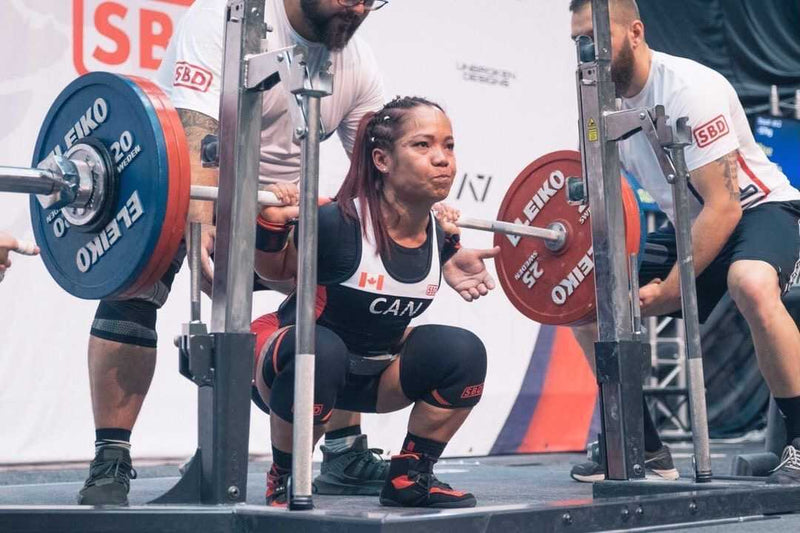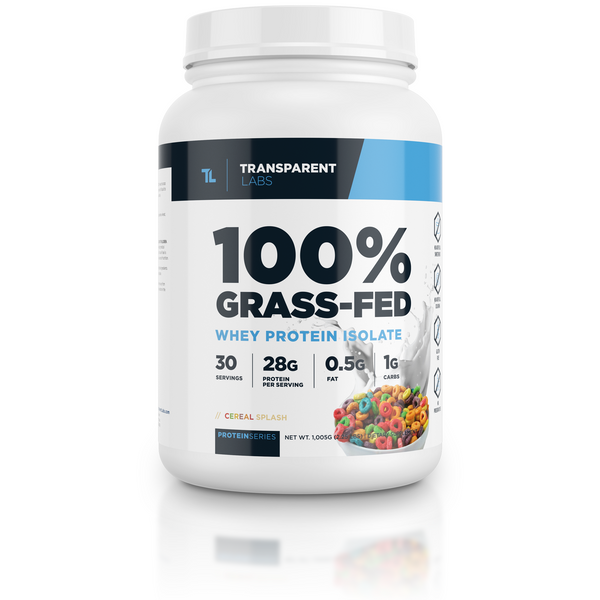Powerlifting Diet 101: Performance Nutrition for the Strength Athlete

Should Powerlifters follow a Bodybuilding Diet Plan?
Bodybuilding diets seem to get the lion's share of attention when it comes to health and performance, but what about powerlifting nutrition? Should strength athletes follow the same meal plan as bodybuilders for optimal results? Well, yes and no.
There is no cookie-cutter "ideal" powerlifting diet plan that all strength athletes should adopt. However, powerlifters and bodybuilders can learn quite a bit from one another when it comes to performance nutrition. After all, muscle mass and strength generally go hand in hand, and they are by no means mutually exclusive outcomes of resistance training.
If you're a competitive powerlifter, the key is controlling your body weight (and body composition) so you don't overshoot the limit for your respective weight class on competition day. Naturally, this also means you need to avoid excess weight gain by monitoring caloric intake in the offseason; the last thing you want in the final weeks of training before a competition is having to drastically cut calories just to make weight.
With that in mind, we had the pleasure of interviewing Transparent Labs powerlifter and International Powerlifting Federation (IPF) champion Maria Htee about her nutrition strategies and what a typical meal plan looks like. She also filled us in on her favorite supplements to use for strength-training sessions and on competition day.
Maria's Powerlifter Diet Meal Plan
In terms of physicality, Maria Htee is Dense (with a capital D). The Canadian stands just 4'11" tall and competes in the 57 kg weight class (125.4 lbs). But one look at her physique and you realize she packs plenty of muscle mass into her short frame with very little body fat for a female.
Don't let Maria's size fool you — she has accomplished some remarkable feats as a competitive powerlifter. In fact, she holds the IPF Canadian records for the squat (174 kg), bench press (103 kg), deadlift (188 kg), and three-lift total (468.5 kg). (Yes, that means she squats and deadlifts more than three times her body weight!)

To perform at such a high level, Maria not only trains hard but takes her nutrition seriously year-round. Whether she's trying to lose weight or build muscle, she eats every 3-4 hours throughout the day and generally doesn't consume heavily processed foods.
So, what exactly does Maria Htee's powerlifting nutrition plan look like leading up to a competition? Let's take a look:
7:00 AM — Breakfast
- 2 whole eggs + 4 egg whites
- 1 Orange
- 4 capsules of TL Multivitamin
10:00 AM — Mid-Morning Snack
- 1 scoop of TL 100% Grass-Fed Whey Protein chocolate peanut butter flavor mixed in 1/2 cup (cooked) oatmeal
1:30 PM — Pre-Workout Meal
- High-protein, low-carb stir fry made with:
- 120 g (cooked) 93/7 ground beef
- Green veggies
- 15 g almond or peanut butter
2:45 PM — Pre-Workout (30 minutes before training session)
- 1 scoop of Transparent Labs Lean Pre-Workout
3:15 – 4:45 PM — Intra-Workout (Sips on throughout her workout)
- 1 Scoop of Transparent Labs Intra
5:00 PM — Post-Workout Protein Shake
- 1 scoop of TL 100% Grass-Fed Whey Protein Isolate
- 1 scoop of TL Prebiotic Greens
6:30 PM — Post-Workout Meal
- 120 g (cooked) 93/7 ground turkey or chicken breast
- 1/2 cup (cooked) rice or mashed sweet potatoes
- 1/2 avocado
- 2 capsules of TL Turmeric
9:30 PM — Supper
- 120 g (cooked) fish or seafood
- Mixed green veggies (asparagus, broccoli, spinach)
As you can see by Maria's food choices and methodical nutrient timing, a powerlifting diet plan is not just a free-for-all. Sure, super heavyweights may eat tons of calories per day because they have nothing to worry about as far as weigh-ins go, but for the less-hefty powerlifters like Htee, caloric intake and macros (e.g. protein, fat, and carbs) matter.
Body Weight, Caloric Intake, and Macronutrients
Since she is on the shorter side, Maria realizes that her caloric intake doesn't need to be very high even when increasing muscle growth and strength are the goal. Yet, she carries ample muscle tissue and little body fat, so her basal metabolic rate (BMR) is likely quite a bit higher than other females with similar body mass and height.
As far as protein intake goes, Maria consumes about 150 to 160 grams per day (~ 2.5 grams of protein per kilogram of body weight, or 1.13 grams per pound of body weight). She emphasizes lean protein sources like eggs, chicken breast, turkey breast, and fish. Her go-to protein source after training sessions is Transparent Labs 100% Grass-Fed Whey Protein Isolate, which packs 28 grams of protein per scoop to maximize muscle protein synthesis [1].
She also follows a fairly low-carb meal plan with a balance of healthy fat sources like almonds and avocado. When dieting prior to a competition, Maria finds a low-carb approach helps her limit the amount of food she eats. However, she doesn't adhere to a full-blown keto diet, and she's not afraid to indulge in things like chocolate and ice cream from time to time.
Nutrition on Competition Day
On weigh-in day, Maria doesn't do any extreme fluid or calorie-cutting like powerlifters often do to lose weight at the last minute. The benefit of Maria being smart about her powerlifting nutrition in the offseason is that she's able to gain strength without putting on much weight.
When she starts dieting for competition, her foods stay the same — she just eats a lower amount of them while keeping protein intake sufficient. Come weigh-in day, her weight is already where it needs to be; in some cases, she may even try to gain weight in the final week of preparation.
After weigh-ins, Maria likes to eat a fairly high-carb, high-protein meal with foods like steak, eggs, rice (or sweet potato). She doesn't concern herself too much with the exact amount of food she eats after weighing in.
To stay hydrated on competition day, Maria sips on coconut water and electrolytes. She recommends the TL Hydrate as a replacement for conventional electrolytes and coconut water on competition day. Between the squat, bench, and deadlift, she usually eats a banana and protein bar to keep her muscle glycogen full and make sure she has plenty of potassium in her system. Maria notes that she will even eat some chocolate between lifts.

Nail Your Powerlifting Diet to Crush it on the Platform
No matter what training program you follow, you gotta eat like a champ if you want to be a champion powerlifter. Maria Htee is a prime example of how powerlifters should approach their diet leading up to a competition.
While you may have preferences for different foods than Maria, the same core diet principles apply:
- Calories per day matter — use our Macronutrient Calculator as a starting point to determine your needs.
- Eat plenty of protein regardless of your goal (e.g. fat loss, gain weight, build muscle) — 0.8 – 1.2 grams of protein per pound of body weight is a good daily range for powerlifters.
- Drastic weight loss in the weeks leading up to a competition (e.g. 3+ pounds per week) will likely hinder your performance and strength — try to stay within 15 lbs of your target weight class throughout the offseason.
- Carb intake is largely up to personal preference, but remember that muscle glycogen is a key substrate for intense lifting [2]. Thus, severely restricting your carb intake may lead to weight loss and strength loss.
- Focus on quality fat sources, like olive oil, avocado, nut butter, fatty fish, whole eggs, and grass-fed meat. These are rich in monounsaturated and omega-3s that support cardiovascular function and overall health [3, 4].
- Hydrate! It should be intuitive, but many people overlook fluid intake. Dehydration is well-known to impair athletic performance, so make sure you're drinking plenty of water and replacing electrolytes throughout the day [5].
To learn more about Maria Htee's training program and her favorite TL supplements, give her a follow on Instagram: @maria_htee
































